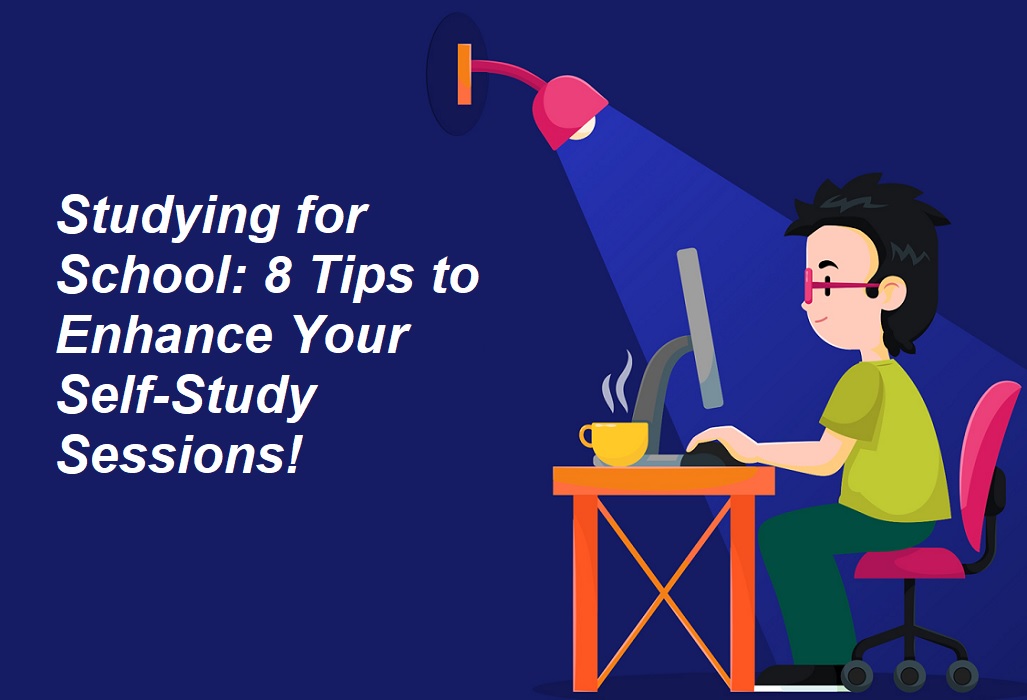Studying for school can be a stressful endeavor, but it doesn't have to be. In fact, there are many things that you can do before you even start studying that will make the process easier and more rewarding. Follow these tips to see how much easier self-guided study sessions can be.
Studying for School: Top Strategies to Enhance Your Self-Study Sessions
1. Plan Your Study Sessions
Planning is the key to achieving academic success. According to an article published by the Journal of Graduate Medical Education, having a to-do list in place increases your productivity by freeing your brain from the burden of unfinished tasks.
Once you've decided how much time you're going to spend each day, consider these tips:
● Set a schedule: Make sure that every study session has a start and end time. This helps you manage your energy levels and stay focused on the task at hand.
● Focus on one topic at a time: Don't try to cover everything in one sitting. Instead, pick out one area or subject for which you have questions and plan it as its own session.
● Set goals for each session: Knowing what exactly will be covered during each session will help you stay on track and make sure that nothing gets missed along the way.
2. Seek Help If You Can’t Figure It Out
If you're struggling with a concept and feeling frustrated, don't be afraid to ask for help. If you don't want or cannot afford a tutor, consider reaching out to friends or family members for assistance. If your school offers tutoring services as part of its learning support program, make sure to take advantage of them.
You can also rely on the internet to get some help. In fact, there are various student-friendly websites where you can get help from top subject-matter experts. The only thing you need to do is put up the question you are struggling with.
And any tutor who specializes in WileyPLUS answers your question based on their expertise on the subject. Seeking help is this easy. Therefore, you should never shy away from asking for help.
3. Take Mental Breaks in Between Study Sessions
It is important to take breaks in between sessions. This can help you stay relaxed and focused and ensures that you get the most out of each session.
While you are on a break, you could do the following things:
● Listen to music
● Take a walk outside or around your house
● Take a power nap
● Read a non-academic book or listen to an audiobook
4. Choose the Right Environment
Make sure that your study area is quiet so that you don't get distracted by anything that could disrupt your concentration. Don’t have bright lights shining on your screen or distracting sounds coming from nearby televisions or radios. You should also make sure that there’s plenty of space around where you're working so that nothing gets knocked over by accident.
5. Stay Hydrated and Keep Your Energy Up with Healthy Snacks
If you're going to be in a study session for more than an hour, make sure that you stay hydrated and keep your energy up with healthy snacks. Research shows that staying hydrated could also lower the risk of depression and anxiety.
Therefore, while you are studying, make sure you follow these drinking and eating habits:
● Drink at least one glass of water before your study session begins, and drink another one every 20 minutes while you're studying. This will help prevent dehydration.
● Eat some vegetables, or other high-nutrient foods whenever possible. These foods can provide nutrients that may increase brain function during your long study sessions.
6. Be Flexible, But Stay on Schedule
You're going to be doing a lot of studying, so it's important that you stay on top of your schedule. To avoid getting too stressed if you miss a day, you should have a strict schedule in place. Don't forget that taking frequent breaks is essential to keep yourself sane and focused throughout the process.
If you're ahead of schedule, don't get too relaxed. You still need to maintain discipline. If the opposite happens and you fall behind, don't let yourself get anxious. Just review what has been covered already and move forward from there. In general, try not to let any feeling become overwhelming enough that it makes it harder for you to study effectively.
7. Celebrate the Small Wins
The biggest mistake people make when self-studying is that they get discouraged when they don't get it right the first time. It's important to celebrate every little success, no matter how small. Be patient with yourself and keep a positive attitude. Little by little, you can achieve all your goals.
8. Find the Right Balance Between Hard Work and Enjoyment
Successful studying comes down to maintaining your motivation and finding the right balance between hard work and enjoyment.
While studying for school may feel like a lot of work, it can actually be quite enjoyable. The key is to find a study strategy that works well for you. If you're struggling with this, here are some tips:
● Find your passion: You'll have more fun learning when you're passionate about what you're doing.
● Remember that learning doesn't always have to be about the material itself. It is also about improving your ability to learn new things in general.
● Don't forget to relax: You can get better at anything by practicing, even if that means taking breaks every now and then.
Conclusion:
I hope that you’ve learned a few helpful tips to help you study more efficiently. Remember that there is no one right way to go about studying, and it can take time for your own methods to develop. The most important thing is that you find what works for you. Keep trying new things until something clicks.








COMMENTS